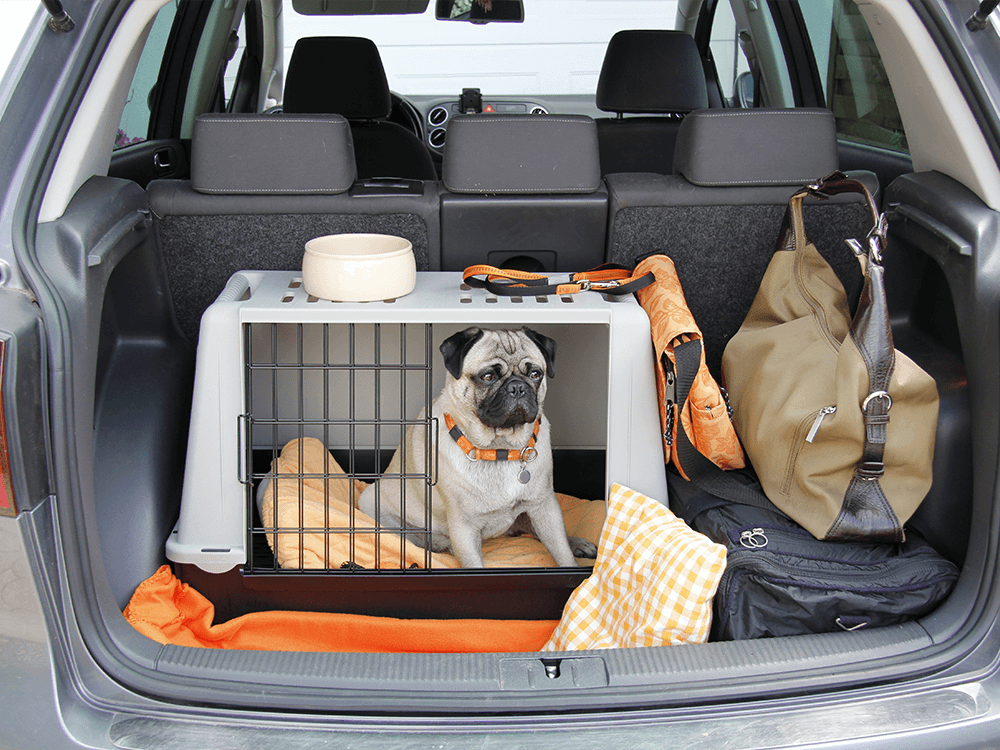Updated last 15th September 2020
If you're in a situation where you need to entrust the safety of your dog to someone else, consider one of the dog kennels in your area.
A boarding kennel is generally a safe and secure environment where your dog can be looked after whilst you're away. It may not be the ideal scenario that you want, but it's the best option you could hope for, especially if your chosen dog kennel is a real home from home.
If you're a dog parent who's boarding your dog for the first time, this guide will help you find the right dog kennel to suite you and your dog’s requirements, and learn the necessary preparation for a stress-free boarding experience.
 What's the difference between dog sitting and boarding?
What's the difference between dog sitting and boarding?
Dog sitting
Also known as in-home dog boarding, dog sitting mean hiring a sitter who would take care of your pooch whilst you're away. You would have to discuss the arrangement and come to an agreement. The dog sitter may stay overnight or drop by your home and stay for a short while to care for your dog in your absence.
This is a great option if you have a senior dog, a shy dog, or a dog with separation anxiety.
Dog Boarding
With boarding kennels, you'll send your dog to the boarding facility where he will be staying there with other dogs. If you have a sociable and happy-go-lucky pooch, this place is a good choice for him.
Some vets also offer dog boarding. It is a convenient alternative for dog owners who can't find a dog sitter at short notice. An ideal dog boarding facility will ensure that your pooch's daily needs are met despite having to care for other dogs
 What are the requirements needed before you can board your dog?
What are the requirements needed before you can board your dog?
Dog kennels and catteries must follow the guidance set by the Department for Environment Food & Rural Affairs (Defra) in line with the Animal Welfare (Licensing of Activities Involving Animals) (England) Regulations 2018.
Under the guidance, vaccinations are a mandatory requirement in dog boarding kennels.
- Updated vet vaccination record must be presented to ensure that dogs are vaccinated against canine parvovirus, distemper, canine adenovirus/canine hepatitis, and leptospirosis.
- Some dog kennel establishments may require vaccination against kennel cough (Bordetella and canine parainfluenza virus).
- If booster vaccination is not available, the boarding kennel may accept a certification from the vet that your dog has undergone a protective titre test.
- Primary (core) vaccination must be completed at least two weeks before boarding.
- Dogs with fleas, ticks, or lice must be treated with products licensed for use in the UK and authorised by the Veterinary Medicines Directorate (VMD).
 Do dog kennels accept puppies?
Do dog kennels accept puppies?
It depends on the dog boarding facility you are sending him to. The average minimum age of puppies, which is accepted in dog kennels is around 4 months old. Most dog boarding kennels require puppies to have their first round of vaccinations before they are admitted.
However, it is strongly advised to let your puppy complete his shots which takes about 16 weeks. This ensures that he is more protected from diseases. Many dog kennels also require puppies to have treatment for flea, worms, and other external parasites.
How much do dog kennels cost?
The prices of dog boarding kennels may vary. In general, licensed kennels will charge you £15-£18 for a night's stay. Many factors can affect pricing, such as:
- Location
- Number of dogs
- Duration of the booking
- Facilities
- Peak season (price tends to be higher) or Off-peak season
- Availing additional services
 What should I look for in dog kennel?
What should I look for in dog kennel?
Before you decide on the boarding kennel, there are several things you need to check such as:
- Daily life in the dog kennels Observe if the dogs have easy access to the outdoor play area. Ask the staff about the rules they have when it gets too hot or cold for the pooches to go outside. Check how loud is the kennel as well, and make sure that noise is only minimal. Too much noise can be stressful for your dog and may keep him from sleeping soundly.
- Dog boarding kennel's safety Take a look at the safety protocols of the boarding kennel. Do they have sturdy and tall fencing, reliable double gates, and other safety measures to keep dogs from accidentally escaping? It would be good to ask the staff if someone checks on the dogs at night. If not, enquire how they prevent dogs from escaping.
- Cleanliness of the dog boarding kennel Ask the staff about their cleaning schedule and how often they disinfect the play areas and dog kennels. Never go for facilities that don't sanitise as often as they should because it can put your dog at risk of catching bacterial or viral diseases.

- Number and schedules of staff Be sure that there is enough staff to accommodate the dogs. This is extremely important, especially if your dog has special needs such as medications. There must be someone present at the right schedule to administer it. Sometimes fights may suddenly break out too. There must always be someone present to keep watch on them. Check if the staff is well-trained in handling dog aggression and rough play as well. Also, try to observe how the staff interacts with you and how they treat other pet owners. This is a good indicator of how well they handle customer service.
- Emergency protocols Check if the dog boarding kennel has an on-site vet in case of emergencies. If they don't have one, ask about their emergency protocols in the event a dog needs immediate medical care.
- Opportunities for exercise Many dog kennels are designed with a secure open space where dogs can run around and exercise safely. Exercise must include at least one walk per day. If there is an exercise program, consideration must be given to the dog's age, physical and mental condition, and breed type to ensure that the activities are safe. If a dog needs to be walked outside the premises of the facility, he must be kept on a lead at all times. A maximum of four dogs can be walked at the same time. Aggressive dogs must be walked separately to avoid fights and injuries.
- Soothing music, sounds, and visuals Some dog kennels play soothing music created for dogs at specific times of day to calm the dogs, especially those with separation anxiety. Leaving the TV or radio on will make dogs hear human voices which can calm them down. If your dog responds well to music, look for a kennel that plays music or lets dogs watch TV. A dog kennel designed with a fireplace is worth considering, especially during the winter. If your dog loves to lay close to a fire, having one would make him feel right at home.
- Additional services Ask about the additional services that the dog kennel offers. An extra 30-minute walk or exercise can be accommodated for an additional fee. Dogs with a heavy coat or a long coat can be given a bath or a good brushing. If your dog needs extra attention, make sure to ask if your specific requests can be accommodated.
- If you have selected a dog kennel but still feel unsure, consider doing a test run. Board your dog overnight and see if he does well or not. It will help in guaranteeing that your pooch feels comfortable and secure whilst you are away.
 What to prepare before dropping my dog to the boarding kennel
What to prepare before dropping my dog to the boarding kennel
Planning schedules, listing down important information, and packing the right things ahead of time will contribute to a stress-free boarding. Here are the things you need to do before sending your pooch to a dog boarding kennel:
- Prepare up to date vaccinations and health records. Again, every boarding kennel has a different vaccine and health check requirements. So be sure to list them down and prepare the necessary documents. It is advised that vaccinations should be administered around 10 to 14 days before the scheduled dog boarding day.
- Set up an early schedule. To avoid losing your reservation, make sure to book in advance. If you are going away for a short time, book it at least two or three weeks ahead. In case of longer vacation trips, making a reservation about 2 months in advance will do.
- Jot down important information. Be sure to provide your name, phone number, address, and your dog's name. Do not forget to add the vet's contact information and other emergency contacts, such as a trusted family friend. Check if your dog's collar and microchip are updated and accurate.
- Bring your dog food. Avoid sudden changes in your dog's diet even when he is in a dog kennel. Pack enough of his high-quality dog food and treats that will last until you come back. Remind the staff not to feed your dog with other foods to prevent upsetting his stomach.
- Pack the essentials. Let your furry friend feel at home by bringing his favourite toys, treats, food bowl, and water bowl. These items have the smell of home and will make him feel less lonely. Do not forget to bring his leash and harness as well.
- Do not forget his medications. If your dog requires certain medications, list down the necessary number of doses, dosage amount, and instructions when it should be administered. If the medicine should be taken with food, consider placing this information in pre-packed meal bags.
